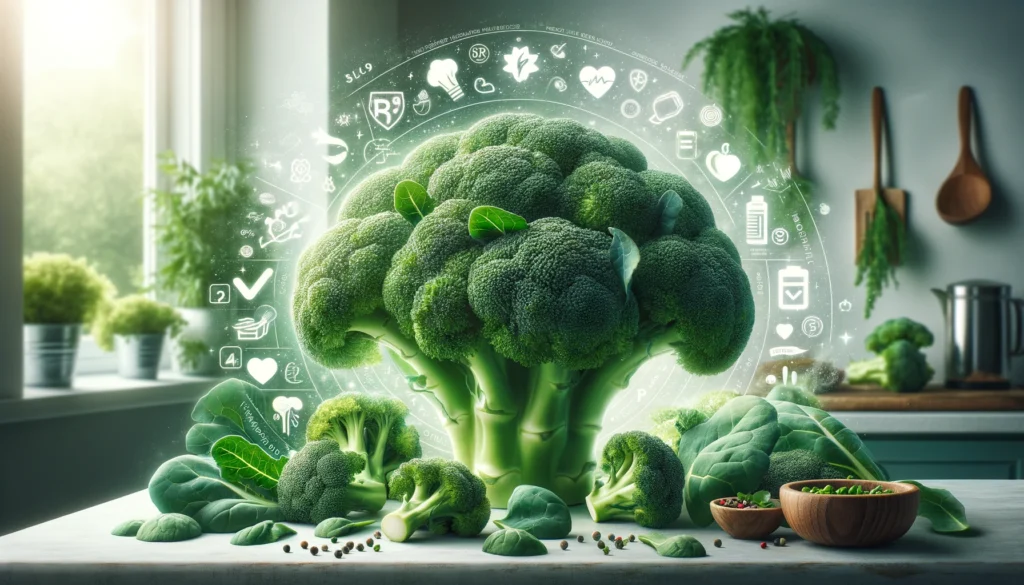- Broccoli, a versatile and nutritious vegetable, is a staple in clean eating.
- Packed with vitamins, minerals, and antioxidants, broccoli offers numerous health benefits.
- This article explores its nutritional value, culinary uses, and its role in various diets.

Broccoli, often hailed as a superfood, has earned its place on the clean eating stage. Its rich nutrient profile, versatility in the kitchen, and numerous health benefits make it a go-to choice for those aiming to maintain a wholesome diet. In this comprehensive guide, we delve into the world of broccoli, exploring its nutritional benefits, culinary applications, and its significance in various dietary plans.
. Nutritional Benefits of Broccoli
Broccoli stands out as a powerhouse of nutrients. With high levels of vitamins such as vitamin C, vitamin K, and folate, along with essential minerals like iron and potassium, it contributes significantly to overall well-being. Its antioxidant properties, mainly attributed to compounds like sulforaphane, make it a key player in promoting a healthy immune system.
Broccoli’s Antioxidant Riches
Broccoli contains a variety of antioxidants, including quercetin and lutein, that combat oxidative stress. These antioxidants play a crucial role in neutralizing free radicals, supporting cellular health and reducing the risk of chronic diseases.
Fiber for Digestive Health
The fiber content in broccoli aids in digestion and promotes a healthy gut. Broccoli is an excellent source of both soluble and insoluble fiber, contributing to regular bowel movements and overall digestive well-being.
Immune System Boost
The high vitamin C content in broccoli supports the immune system, helping the body fend off infections and illnesses. Regular consumption of broccoli can be a natural way to enhance immune function.
. Culinary Uses and Recipes
Broccoli in Salads and Side Dishes
Adding broccoli to salads and side dishes not only enhances flavor but also boosts the nutritional value of the meal. Try incorporating steamed broccoli florets into your favorite salad for a crunchy and nutritious twist.
Featured Recipe: Cauliflower Steak with Tomato Sauce
Explore the delicious side of clean eating with the featured recipe, “Cauliflower Steak with Tomato Sauce.” This innovative dish combines the goodness of cauliflower and the nutritional punch of broccoli, creating a satisfying and healthy meal.
Innovative Ways to Incorporate Broccoli
From stir-fries to soups, there are countless ways to include broccoli in your daily meals. Experiment with different cooking methods to find the one that suits your taste buds best.
. Superfood Spotlight: Broccoli
As we continue our exploration of broccoli, it’s time to cast a spotlight on its standing among the superheroes of the clean eating world—superfoods. Renowned for their exceptional nutritional profiles, superfoods like broccoli offer a myriad of health benefits that elevate them to dietary stardom.
The Superfood Identity of Broccoli
Broccoli earns its place in the superfood pantheon due to its concentration of essential nutrients and health-promoting compounds. Let’s delve into the reasons that make broccoli a standout superfood:
Rich in Antioxidants
Broccoli boasts a spectrum of antioxidants, including quercetin and sulforaphane, which play a pivotal role in neutralizing free radicals, supporting cellular health, and reducing inflammation.
Abundance of Vitamins and Minerals
With a robust nutrient profile, broccoli delivers essential vitamins such as vitamin C, vitamin K, and minerals like iron and potassium, contributing to overall well-being.
Comparison Table: Nutrient Density in Superfoods
| Superfood | Vitamin C (mg per 100g) | Iron (mg per 100g) | Potassium (mg per 100g) |
|---|---|---|---|
| Broccoli | 81.2 | 1.1 | 316 |
| Spinach | 47.9 | 2.7 | 558 |
| Kale | 93.4 | 1.5 | 491 |
Note: Values are approximate and may vary based on preparation methods.
Superfood Spotlight
Explore a dedicated article on superfoods that places broccoli at the forefront. Learn about the nutritional powerhouse of broccoli and discover its role among other superfoods.
- Nutrient-dense superfoods
- Antioxidant-rich vegetables
- Broccoli earns its superfood status through a rich nutrient profile.
- Broccoli and Cheese Stuffed Baked Potatoes: A simple and hearty meal.
- Broccoli and Chicken Stir-Fry: Quick, flavorful, and loaded with nutrients.
- Broccoli Soup: A comforting option for a busy day.Antioxidants, vitamins, and minerals in broccoli contribute to overall health.
Frequently Asked Questions: Broccoli Unveiled
Q1: Can Broccoli Help in Weight Loss?
Absolutely! Broccoli’s low-calorie density and high-nutrient content make it an excellent choice for those aiming to shed excess weight. Including broccoli in meals can contribute to a satisfying and nutritious diet conducive to weight loss.
Q2: How Does Broccoli Support Gut Health?
The fiber-rich content of broccoli acts as a prebiotic, promoting the growth of beneficial bacteria in the gut. This, in turn, supports a healthy gut microbiome, aiding in digestion and nutrient absorption.
Q3: What Makes Broccoli a Superfood?
Broccoli earns its superfood status due to its rich concentration of antioxidants, vitamins, and minerals. Compounds like quercetin and sulforaphane contribute to its exceptional health-promoting properties.
Q4: Can Broccoli Be Included in High-Protein Diets?
Certainly! While not traditionally viewed as a high-protein source, broccoli provides a surprising amount of protein. Combining it with other protein-rich foods creates balanced and nutritious meals.
Q5: Is Broccoli Suitable for Special Diets?
Yes, indeed! Whether you follow a vegetarian, vegan, or gluten-free diet, broccoli seamlessly integrates into various dietary plans. It offers essential nutrients like iron and calcium for those on plant-based diets.
Conclusion: Embracing the Power of Broccoli
In conclusion, broccoli emerges as a nutritional powerhouse, offering a diverse range of benefits. From supporting weight loss and gut health to earning its status as a superfood, broccoli proves its versatility in catering to different dietary needs.
As you navigate your clean eating journey, consider incorporating broccoli into your meals for a flavorful, nutrient-packed boost. For more in-depth insights and recipes, explore the various articles linked throughout this guide, and let the wholesome goodness of broccoli become a staple in your clean eating repertoire.
. Unveiling Broccoli: FAQs Answered
Q1: Is Broccoli Suitable for a Keto Diet?
Absolutely! Broccoli is a keto-friendly vegetable that is low in carbs and high in fiber. It can be a valuable addition to keto meals, contributing to both nutritional content and flavor.
Q2: Can Broccoli Be Consumed Raw?
Certainly! Eating broccoli raw preserves its nutrient content. You can enjoy it as a crunchy snack, in salads, or as part of veggie platters for a refreshing and nutritious treat.
Q3: What’s the Best Way to Cook Broccoli to Retain Nutrients?
Steaming or microwaving broccoli is considered one of the best methods to retain its nutrient content. These cooking methods help preserve the integrity of vitamins and antioxidants.
Q4: How Can I Incorporate Broccoli into Kids’ Meals?
Making broccoli kid-friendly is easier than you think. Try including it in pasta dishes, blending it into smoothies, or creating fun shapes in stir-fries to make it more appealing.
Q5: Can I Freeze Broccoli for Later Use?
Yes, freezing broccoli is a great way to preserve it for future use. Blanching before freezing helps maintain its texture and nutritional value.
Q6: What Are Some Quick Broccoli Recipes for Busy Days?
- Broccoli is versatile and can be included in various diets, including keto.
- Enjoying broccoli raw or lightly cooked preserves its nutritional benefits.
- Kid-friendly recipes and quick meal ideas make incorporating broccoli into your routine easy.
- In your clean eating journey, explore the vast array of possibilities that broccoli offers. For more detailed recipes and insights, refer to the articles linked throughout this FAQ guide. Continue to embrace the wholesome goodness of broccoli in your culinary adventures.
